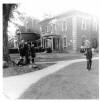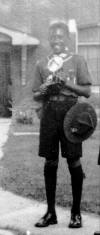Ferguson Arthur Jenkins
Born:
December 13th, 1942
Chatham, Ontario, Canada
Resides:
Anthem, Arizona
MLB Teams:
Philadelphia Phillies (1965-1966)
Chicago Cubs (1966-1973)
Texas Rangers (1974-1975)
Boston Red Sox (1976-1977)
Texas Rangers (1978-1981)
Chicago Cubs (1982-1983)
Notable Stats:
Inducted to Canadian Baseball Hall of Fame 1987
Inducted to National League Hall of Fame 1991
Inducted to Texas Rangers Hall of Fame 2004
Comeback Player of the Year 1974
NL Cy Young Award Winner 1971
3, 192 Strikeouts
997 Walks
49 Career Shutouts
284 Career Wins
267 Career Completed Games
Interesting Facts:
Played 2 years with the Harlem Globetrotters 1967-69
Pitched in four All Star games
Only pitcher with 3,000+ strikeouts and less than 1000 walks
13 Career Home Runs
7-20 Game Winning Seasons
Biography:
Fergie Jenkins grew up in Canada, where he excelled in baseball, basketball, and hockey, competing in Canada's highest amateur hockey league. Upon graduation from high school in the early 1960s, he signed with the Philadelphia Phillies. Originally a relief pitcher, he was converted into a starting pitcher shortly after being acquired by the Chicago Cubs in 1966. Canadian-born Ferguson Arthur Jenkins had an All-Star second season as a starting pitcher in 1967 with the Chicago Cubs after Leo Durocher converted him from a reliever. Drafted from Chatham, Ontario, Canada by the Phillies in 1963, Jenkins had worked his way out of the minors and after a trade starred for the Cubs.
Special Note from Carlos Valle - " I was a
little kid listening to baseball game in Nicaragua, and Ferguson
pitched on a professional baseball team, called Leon in Nicaragua.
He was already a professional pitcher before he came to Philly. Just
two months ago I was talking about him with the son of his former
team mate, Horestes " El Coaco Hernendez. If I am not wrong, his
coach at the leon team in Nicaragua was Tony Castano or Wilfredo
Calvino."
On July 11, the 23-year-old Jenkins took the mound at Anaheim Stadium in the 1967 All-Star Game. Known as Fergie, the right-handed, future National League Cy Young Memorial Award winner was representing the Cubs. Jenkins, who was on pace to lead the majors with 20 complete games that year, had a 2.80 ERA and threw at 93-94 mph with pin-point control that evening. The 6-foot-5 Fergie Jenkins proceeded to strike out six of the best sluggers in modern American League history. He sat down Harmon Killebrew (who led the league that year with 44 homers), Tony Conigliaro (hitting .297), Mickey Mantle (who had hit his 500th homer on May 14), Jim Fregosi (1966 AL Rookie of the Year), Rod Carew (1967 AL Rookie of the Year) and Tony Oliva (who topped the AL in doubles that year with 34). Jenkins' six strikeouts in an All-Star Game (where pitchers may only work three innings) put him in the major-league record book. Only Carl Hubbell, Johnny Vander Meer and Larry Jansen match his record as an All-Star strikeout artist. Jenkins was selected to the All-Star Game again in '68, '71 (when he led the NL with 24 wins) and '72.
Fergie was a durable, consistent strikeout artist for many years to come. He led the NL with 40 starts in 1968, going 20-15 with a season-record five 1-0 losses. His 1968 nine shutout losses were the most this century by a 20-game winner. He was selected the Sporting News Player of the Year in 1968. He led the NL in strikeouts in 1969 and fanned more than 224 batters for six seasons. Jenkins set a Cubs' record with 274 strikeouts in 1970. He pitched more than 300 innings a season from 1968 to 1971 for the Cubs. He walked less than 84 hitters a season and threw six consecutive 20-game winning seasons as a Cub, ending in 1972. He won in double figures for his first 14 years as a major-league pitcher and finished with 267 complete games. With 49 career shutouts, his 284 wins in the majors represent the most victories ever for a black pitcher. Fergie Jenkins put together one of the best seasons in the modern era in 1971 when he became the first Chicago Cub to win the NL Cy Young Award. With a 2.77 ERA, he led the NL with 24 wins, 30 complete games and 325 innings. That year he halved his normal number of walks by giving up only one per nine innings pitched. He threw 263 strikeouts and 37 bases on balls (a 7.1:1 ratio). He helped in the batters box that year by hitting .243 and six home runs, which included two in one game. Jenkins was a complete player. On defense in four seasons ('68, '76, 181, and '83) he had a 1.000 fielding average. These four years saw him tie the all-time majors record as a great fielding pitcher. He also led the league in put-outs as a pitcher in '71, '72, and 178 and double plays with five in '68. Following his trade in 1974 to the Texas Rangers, Jenkins easily adjusted to AL hitters. Jenkins became the Rangers' first 20-game winner and still their only 25-game winner in 1974. This er-high win total led the American League. He pitched 29 complete games, 328 innings, 45 walks (1.2 per nine innings) and 245 strikeouts for a 5.4:1 strikeout-to-walk ratio. Jenkins and Catfish Hunter tied for the MLB lead in wins with 25 and Hunter just edged Jenkins in the AL Cy Young Award voting.
Fergie Jenkins became only the fourth pitcher in history to win more than
100 games in both leagues. Cy Young, Jim Bunning, and Gaylord Perry
were the first three to accomplish this rare pitching record. Only other pitcher
has gone on to join that elite club is Nolan Ryan. Jenkins played two years for the Rangers and then was traded to the Boston Red Sox for two more years before being traded back to the Rangers for four more years.
In 1982 he was traded back to the Cubs where he finished his career the following year as club leader in strikeouts, with 274 in a season and 2,036 in a career. His six consecutive 20-game winning seasons as a Cub were rare accomplishments in the majors. Although Guthrie, Okla., resident Jenkins retired in 1983, it wasn't until 1993 that another NL pitcher, Tom Glavine, could put together three consecutive 20-win seasons. Pin-point accuracy allowed Jenkins to retire as the ultimate control pitcher in the game, establishing arguably the best finesse record in 128 years of organized baseball. Jenkins walked fewer than two batters per nine innings for his 18-year and 35 day, major-league career. Fergie Jenkins is the only pitcher in history to record more than 3,000 strike-outs (3,192), while giving up less than 1,000 walks (997). Jenkins was enshrined in the National Baseball Hall of Fame in Cooperstown, N.Y., on July 21, 1991. He was voted in with Rod Carew (who he struck out as one of his six in the 1967 All-Star Game) and Gaylord Perry, the only other Ranger in the Hall of Fame. Jenkins is the only Canadian honored in Cooperstown and he is ninth on the all-time strikeout list. After coaching minor-league pitchers for the Texas Rangers and Cincinnati Reds, Jenkins was named the Chicago Cubs' pitching coach for the 1995 and 1996 seasons. It was exactly 28 years after his pin-point control and six strikeouts in the 1967 All-Star Game that Jenkins was the NL honorary coach in the July 11, 1995, All-Star Game. The Texas Rangers were the host club at The Ballpark in Arlington. Retired Ranger Nolan Ryan was the AL honorary coach in that game. Jenkins' selection heralded his return to the major leagues as a pitching coach.
Source:
Encyclopedia Brittanica & Darl Devault,
Halloffamer.com
Career Stats
363 Career Putouts (P): #3 All-Time.
3192 Career Strikeouts Thrown: #9 All-Time.
49 Career Shutouts: Tied for #21 All-Time
284 Career Wins: Tied for #24 All-Time.
4500 Career Innings Pitched: #25 All-Time.
664 Career Games Pitched In: #63 All-Time.
1.000 Fielding Average (P) in 1968 Tied for #1 All-Time.
1.000 Fielding Average (P) in 1976: Tied for #1 All-Time.
1.000 Fielding Average (P) in 1981: Tied for #1 All-Time.
Fielding Average (P) in 1983: Tied for #1 All-Time.
5 Double Plays (P) in 1968: #1 in National League.
1.000 Fielding Average (P) in 1976: Tied for #1 in American League.
1.000 Fielding Average (P) in 1983: Tied for #I in National League.
1.000 Fielding Average (P) in 1981: Tied for #1 in American League.
1.000 Fielding Average (P) in 1968: Tied for #1 in National League.
40 Games Started in 1968: #1 in National League.
42 Games Started in 1969: #1 in National League.
39 Games Started in 1971: Tied for #1 in National League.
325 Innings Pitched in 1971: #1 in National League.
28 Putouts (P) in 1972: #1 in National League.
31 Putouts (P) in 1971: #1 in National League.
29 Putouts (P) in 1978: #1 in American League.
273 Strikeouts Thrown in 1969: #1 in National League.
2.2 Total Chances/Game (P) in 1972: #1 in National League.
25 Wins in 1974: Tied for #1 in American League.
24 Wins in 1971: #1 in National League.
39 Games Started in 1970: #2 in National League.
313 Innings Pitched in 1970: #2 in National League.
328 Innings Pitched in 1974: #2 in American League.
289 Innings Pitched in 1972: #2 in National League.
308 Innings Pitched in 1968: #2 in National League.
.676 Winning Percentage in 1974: Tied for #2 in American League.
6 Shutouts in 1974: Tied for #2 in American League.
7 Shutouts in 1969: Tied for #2 in National League.
236 Strikeouts Thrown in 1967: #2 in National League.
263 Strikeouts Thrown in 1971: #2 in National League.
274 Strikeouts Thrown in 1970: Tied for #2 in National League.
260 Strikeouts Thrown in 1968. #2 in National League.
20 Wins in 1967: #2 in National League.
36 Games Started in 1972: Tied for #3 in National League.
38 Games Started in 1967: Tied for #3 in National League.
37 Games Started in 1979: #3 in American League.
289 Innings Pitched in 1967: #3 in National League.
225 Strikeouts Thrown in 1974: #3 in American League.
20 Wins in 1972: Tied for #3 in National League.
20 Wins in 1968: #3 in National League
21 Wins in 1969: Tied for #3 in National League.
22 Wins in 1970: #3 in National League.
.606 Winning Percentage in 1967: #4 in National League.
5 Shutouts in 1972: Tied for #4 in National League.
164 Strikeouts Thrown in 1979: #4 in American League.
38 Games Started in 1973: #5 in National League.
184 Strikeouts Thrown in 1972: #5 in National League.
|


